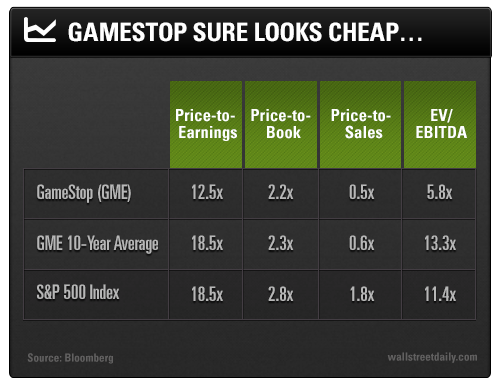When the latest generation of video game consoles from Sony (NYSE:SNE) and Microsoft (NASDAQ:MSFT) launched in 2013, we officially entered the age of the digital video game download.
Not surprisingly, user adoption has been slow. Today, physical game sales still greatly outweigh digital and streaming alternatives – yet it remains clear that the latter are the future of gaming.
And that’s a big reason why I believe the world’s largest video game retailer, despite the fact that it looks cheap right now, is a serious value trap.
GameStop (NYSE:GME) is an American video game retailer that owns and operates over 6,000 brick-and-mortar locations in the United States, Europe, Canada, Australia, and New Zealand. In addition to selling video games, the company owns Apple (NASDAQ:AAPL) reseller Simply Mac and AT&T (NYSE:T) reseller Spring Mobile.
At the moment, the company appears to be significantly undervalued. Let’s take a look at some of its key metrics compared to both its 10-year average and the S&P 500:

Right now, GameStop is trading at a discount based on every metric – even after a significant run-up since December. In fact, the stock has gained nearly 28% since reaching a 52-week low on December 16, yet it’s still cheap. Not to mention, the stock offers a 3.5% dividend yield.
But don’t be fooled however.
Though GameStop won’t succumb to the future of gaming next week or next month, the end is coming – and the company’s best days are behind it. Heck, many investors seem to think the end is just around the corner: GME is one of the most-shorted stocks in the entire market, at 44.3% of total floating shares as of March 12.
What’s more, the stock’s short interest ratio (days to cover) is 42.3… and that means even a little good news for GME could cause an epic “short squeeze,” with investors scurrying to cover their shorts. This could provide an excellent time for current shareholders to exit a position, as this is ultimately not a stock worth holding for the future.
Part of the problem is revenue growth. Take a look at the last three years: 0.8% in 2012, -7% in 2013, and 1.7% in 2014. That’s a far cry from the 36% year-over-year growth that GameStop averaged from 2003 until 2009.
Meanwhile, total debt has steadily increased for each of the last four quarters. In the most recent quarter, total long-term debt jumped from $300,000 to over $350 million. The company said its latest debt issuance will be used to fund stock repurchases and dividend payouts – but we want companies that can fund these with free cash flow, not debt issuance. Plus, the company’s price-to-free cash flow (P/FCF) has spiked, and its free cash flow, which has been negative in two of the last three quarters, is within shouting distance of the $145 million it paid in dividends over the last 12 months.
And speaking of that dividend… while the yield is temping, we also want dividend growth. Unfortunately, GME’s dividend growth has slowed markedly each of the last three years, from 83% to 20% to just 9.1%. That’s not a trend worth pursuing.
The Future of Gaming
Most importantly, the gaming market is moving away from GameStop’s business. The future of video game sales is digital and streaming – not brick-and-mortar retail. It’s simply a matter of time.
Think about it: Only a few years ago, the idea that cable television networks would begin caving to streaming demand would’ve seemed preposterous. Yet Netflix (NASDAQ:NFLX) continues to siphon customers from cable, and more and more people are cutting the cord each day.
Video games aren’t far behind. A report from the Interactive Games & Entertainment Association (IGEA) shows digital videogame sales in Australia climbed 39% in 2014, compared to just 7% for traditional retail games. Another analyst firm, Telsyte, reported 39% growth for mobile games, digital downloads, and subscriptions in 2014.
Finally, new competitors are entering the digital video game space, which will make it even tougher for GameStop to compete going forward. Nvidia (NASDAQ:NVDA), for example, recently unveiled its SHIELD console, which Motley Fool dubbed the “Netflix of games.” SHIELD powers an on-demand gaming service that allows users to stream a wide variety of gaming titles.
Bottom line: When looking for opportunities, we can’t allow a narrow focus on value to land us in a trap. We must be cognizant of forward-looking trends in the industry and avoid companies like GameStop that are relying on outdated models.
